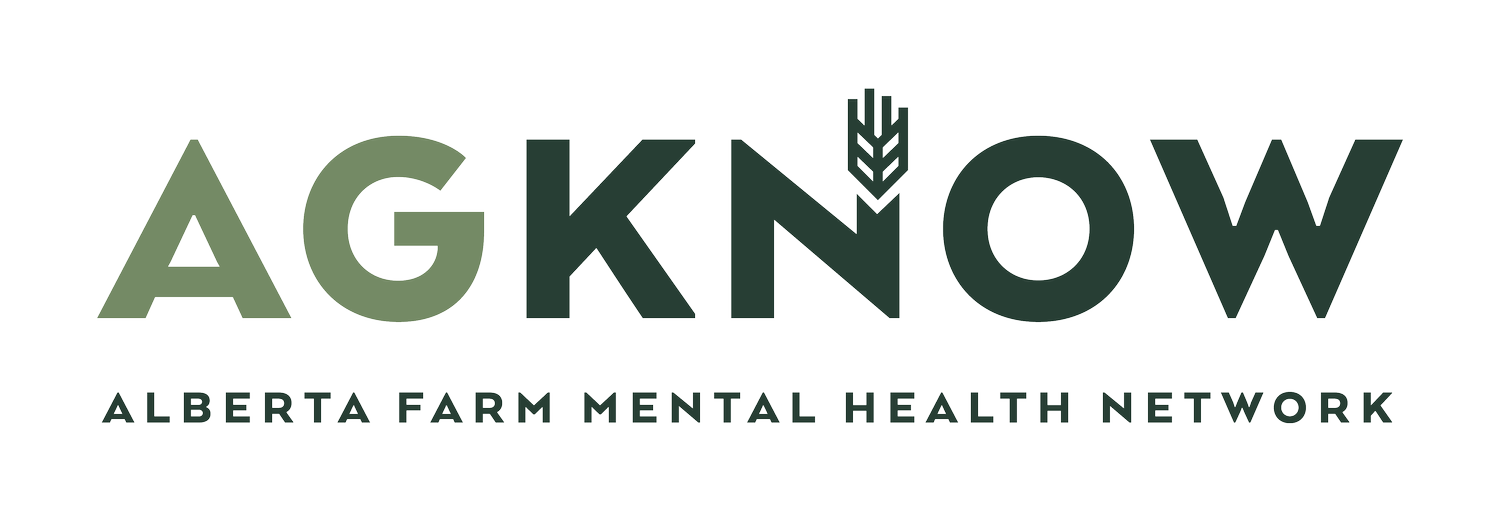THERAPIST NETWORK MEMBER INTERVIEW: AMY MONEA
AMY MONEA
1. why did you want to join the Therapist network at AgKnow?
Joining AgKnow was important to me because of the work they are doing specific to serving Alberta farmers, both through research, education and improving access to appropriately trained therapists. The barriers and needs of farmers is unique and the creation of programs that meets them is so important, and a fit for me.
2. What is your connection to farming?
I grew up on what was initially a multigenerational family run dairy farm. When I was in elementary school, my dad, uncle and grandfather sold the quota and transitioned to a mixed farming operation with a focus on the commercial cow calf operation side of things. I met my husband who grew up on a Red Angus seed stock farm, and in 2015 we had the opportunity to purchase our own place just outside of Carstairs. In partnership with another couple, we run about 115 beef cows with diversifications in a small herd of miniature cattle and rodeo cattle.
3. Why does having good mental health on the farm matter?
I am biased to the mental health benefits and how they can impact quality of life, relationships and the level of functioning of a person (the ability to engage in work that is meaningful, manage responsibilities, etc). There also seems to be benefits when it comes to safety in that when we are more grounded and present, accidents are less likely to happen.
4. FROM YOUR EXPERIENCE, WHAT ARE SOME OF THE MAJOR ISSUES FACING FARMERS TODAY?
Often farming is a business run with family members, so stressors from either area can affect each other and impact job satisfaction and family relationships. This creates difficulties in what many non-farmers would be encouraged to look at “work-life balance” as the separation may not be as clear or even possible in many seasons. Specific issues that affect farmers in my experience include things like succession planning, managing stressors outside of their control such as weather, input costs, illness or disease and decisions made politically.
5. HOW CAN GOING TO THERAPY HELP A FARMER WHO IS STRUGGLING WITH THEIR MENTAL HEALTH?
Therapy is a place where a person can take the thoughts, stresses, worries, fears, or internal experiences outside of their own minds and sort through them with someone that does not have a vested interest in their family or business. Many times, the business and family are connected and it can be difficult to talk about hard things with people you love the most.
6. How can you help a farmer with their mental health? why should they choose you, what can you offer them?
Mental health is quite a broad term and there are many ways depending on what a person is looking for and what they are experiencing. Sometimes it is creating safety to just be able to say the things out loud that you haven’t been able to say before (aside from maybe by yourself in the tractor). Sometimes it is support in figuring out how to navigate a stressful situation or decision. Other times it’s working on skills to manage anxiety or challenge depression, or maybe processing trauma from an accident or a past experience that continues to affect thought or behaviour patterns.
7. what is your preferred style of therapy? Do you have any specializations?
I believe that therapy involves a number of different things at different times based on what a person needs. I have a particular passion for serving rural women, supporting people living with anxiety or depression, and folks who have been impacted by trauma.
In terms of specializations for treatment and my “style”, I have gone through training in CBT (Cognitive Behavioural Therapy which is about addressing unhealthy thought and behaviour patterns), EMDR (Eye Movement Desensitization and Reprocessing which is beneficial in treating trauma), Equine Therapy, Emotionally Focused Therapy (relationship patterns both current and past). Sessions are provided virtually, in person either in an office area in the barn at our farm, or in the indoor arena for equine therapy.
8. WHAT CAN A FARMER EXPECT IN THEIR SESSION WITH YOU?
You can anticipate spending some time at the start of that first session going over what to expect, the process, any questions, and thinking about “fit”. From there, the focus becomes on me learning more about what the “problem” is, who you are, where you come from, and then hopefully give you some recommendations or ideas as to where I see treatment going. Then the real work begins. We will check in at the start of each session, identify a focus for that session and work towards that for the remainder of our time together using whatever method we have agreed upon.
9. WHAT WORDS WOULD YOU USE TO DESCRIBE YOU?
People have described me as soft yet direct, and a good listener. I also believe in efficiency and safety. Sometimes these things have different timelines in therapy, but we can figure that out together.
10. And finally, what’s the one piece of advice that you would recommend to someone who’s struggling with their mental health?
Mental health is health and as such, we can find ourselves in mental health emergencies, impacted by a diagnosable mental illness or psychological injury, or in a state of taking care of our mental wellness. If you are struggling, find a professional that is a fit and start there, whether it’s a family doctor or therapist, or even a crisis line. There are trained professionals ready and available to help you navigate this part of your mental health and health journey.
Interview style:
Written responses.
Amy Monea is a Therapist and Social Worker based in Carstairs, AB. She is available for virtual video sessions and via phone.


